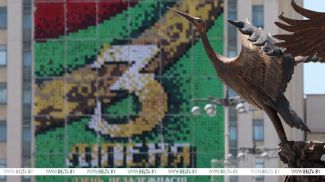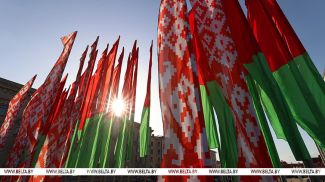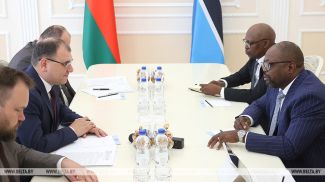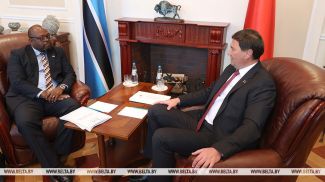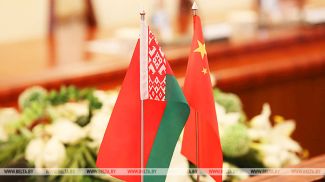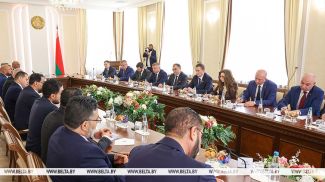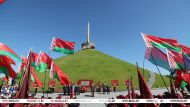MINSK, 29 July (BelTA) – Challenges arising from illegal migration should be counteracted only by joint efforts instead of fence construction. Belarus' Permanent Representative in the Organization for Security and Cooperation in Europe (OSCE) Andrei Lozovik made the statement in a speech on 29 July, BelTA has learned.
Andrei Lozovik drew attention to Lithuania's attitude to honoring international commitments. It was noted that tensions relating to the mass inflow of illegal migrants to southern and eastern borders of the European Union member states is not a new and unexpected phenomenon. The inflow of illegal migrants reflects deep geopolitical processes in the OSCE space and in neighboring areas, the official noted.
Andrei Lozovik went on saying: “This process represents a constant common challenge for the OSCE member states. We can counteract it only through joint efforts instead of fence construction, the deepening of divisive lines in the OSCE space as a whole, the enforcement of sanctions, the closure of skies, and so on.”
Andrei Lozovik reminded that since 2020 due to the coronavirus pandemic the European Union and Belarus have introduced restrictions, including restrictions on border crossing. The measure transformed the established travel routes for legal and illegal migrants on their way to developed countries of the European Union. It also resulted in a rising number of “waiting” migrants in transit countries and exodus countries.
Since early 2021 objective trends have resulted in higher migration flows due to the opening of borders, the softening of quarantine measures, due to seasonal factors, continued tensions in migration risk countries, and due to a number of other factors.
Belarus' representative went on saying: “The Belarusian border service continues taking measures to fight organized forms of illegal transit migration in complicated conditions, including the enforcement of sanctions and the lack of genuine cooperation with the European side, in particular, with Lithuania, which politicizes any contacts with Belarusian authorities. In H1 2021 alone the Belarusian border service suppressed 11 channels of illegal migration to the European Union, 6.5 times up from 2020. As many as 15 organizers of illegal migration were caught and 14 criminal cases were opened. Unfortunately, these facts went unnoticed by those who criticize us.”
Andrei Lozovik added that Belarus had already drawn attention of the OSCE Permanent Council and the OSCE Security Committee to Lithuania's elective approach to Belarusian requests. “But today we would like to draw attention to a number of peculiarities in how the Lithuanian border service treats migrants. First of all, Lithuania's provocations involving the use of force to expel groups of migrants to Belarus are obvious. In the course of these illegal actions Lithuanian law enforcement officers cause bodily harm to the migrants, use psychological pressure against them by demonstrating their readiness to use weapons. In some cases they destroy passports and seize mobile phones,” the diplomat noted.
Apart from that, Lithuanian patrol vehicles move along the border with sirens blazing. Foot patrols do not hide themselves. They also fire shots in the air using issue weapons.
According to the source, some migrants, who have been expelled to Belarus, say they had been beaten with police batons, deprived of food and drinks. Women, including pregnant ones, and children had been treated harshly. “All of that demonstrates the disregard of Lithuanian authorities for human rights regarding migrants,” Andrei Lozovik stressed. “Now violations of human rights are legislated in Lithuania. On 21 July the law on the legal status of foreign persons was amended to restrict the free movement of migrants in Lithuania, restrict other rights of migrants, violate the principle of non-refoulement of asylum seekers. Asylum seekers cannot appeal first-instance judgment decisions.”
Andrei Lozovik wondered why those, who traditionally criticize Belarus, start actively criticizing Belarusian legislation reforms even during the development stage and yet fail to notice unambiguous provisions of this Lithuanian law even after it was adopted.
Andrei Lozovik also expressed concerns about the forced dispersal of peaceful protests against the construction of migrant camps this week. Peaceful protesters and reporters were hurt as a result of police actions.
Andrei Lozovik said: “Once again we call upon Lithuanian authorities to observe their international commitments in the area of human rights, including rights of migrants and commitments within the OSCE framework, which were stipulated by statements and decisions of the Foreign Ministers Council in Sofia in 2004, Brussels in 2006, and Athens in 2009 and by the Convention on the Rights of Refugees.”
Taking into account the OSCE's attention to ecological matters Andrei Lozovik also drew attention to the threat to the preservation of biological diversity near the Belarusian-Lithuanian border. “Lithuania builds razor wire fences, which sends us back to World War One times. Since razor wire fences do not allow animals to pass, mass media have already reported multiple cases when animals get entangled in razor wire and die. If I am not mistaken, active animal migration will begin in this area in late August. Meanwhile, a number of countries, including one aspiring to become the OSCE presiding country, are ready to help Lithuania procure the deadly razor wire it lacks,” the Belarusian diplomat said.
Andrei Lozovik urged the Lithuanian side to honor its migration-related commitments and observe the Convention on Biological Diversity. The Belarusian Natural Resources and Environmental Protection Ministry had sent the relevant request to Lithuanian colleagues, including considering the need to evaluate environmental impact. “We expect a prompt and comprehensive response from the Lithuanian side,” the official said.
In response to accusations saddling Belarus with the responsibility for the migration crisis, the official noted Belarus could not be blamed for the crisis in Lithuania. “Face the truth. Belarus is not the reason for the migration crisis in Lithuania or other Western countries. It is obvious that the governments of these countries triggered a flow of migrants trying to reach European countries by supporting color revolutions in Middle East and North Africa countries,” he said.
“We would also like to emphasize the need for Lithuanian law enforcement to fight criminal groups in Lithuania that foster illegal migration. Rest assured that competent Belarusian authorities will deal with Belarusian criminals,” Andrei Lozovik said.
In conclusion the official stressed that the protection of the state border relies on good neighborly cooperation instead of political statements.




